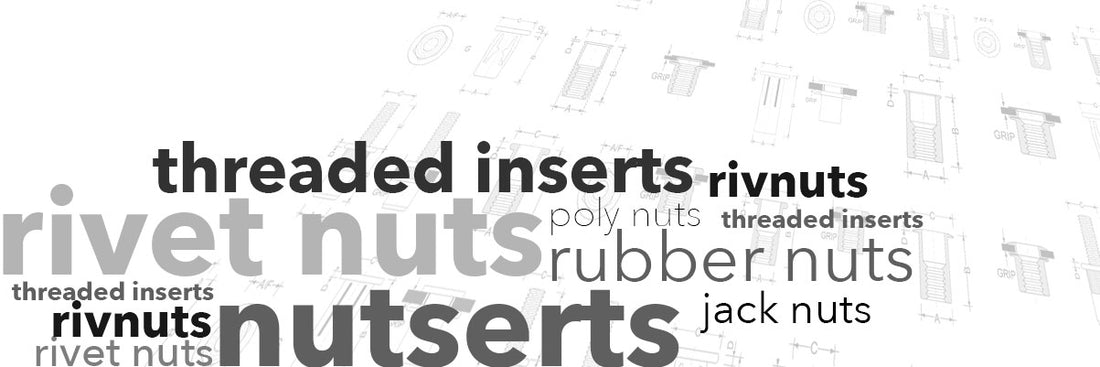Rivet Nuts, Nutserts, Rivnuts, Poly Nuts, Jack Nuts, Plus Nuts, Well Nuts, Threaded Inserts…
… Whatever you like to call them, we’re talking about captive threaded fasteners that can be installed into blind holes (accessible from one side) into materials such as sheet metal, plastics, fibreglass and timber.
These fasteners are incredibly versatile, so depending on the application, they can be installed with simple manual rivnut tools intended for low-volume installation or air-powered hydraulic and cordless nutsert guns for higher production applications.
So, why would you choose a rivet nut over a conventional nut?
1. The installed rivet nut is captive: Because a rivet nut expands on the blind side of the hole into which it has been installed, it can’t fall out.
2. It speeds up production: Rivet nuts are very quick to install, whether you’re using a manual or a powered tool.
3. High pull-out and push-out values: This means that once a rivet nut is installed, it is not easy to remove. It will remain in place for years to come. Perfect for unusual joints: Rivet nuts can be installed in areas where it may be impossible to find access to hold a nut in place, such as a square tube section.4. Creates a sturdy captive thread: A rivet nut provides the perfect solution for fastening together thin materials too thin to be tapped.
5. The appearance is neat and professional: You will get a tidy, low-flange appearance every single time.
Rivet nuts stand up to vibration, weather and wear and tear much better than normal screws.
Where would you use a rivet nut?
Rivet nuts can be used anywhere. They can be used in any application in place of a conventional nut. But common uses include:
- Automotive
- Aerospace
- Heating, venting and air conditioning (HVAC)
- White Goods
- Balustrades
- Electronics
- Furniture
- Awnings
- Door Hardware
- Electrical switchboards and enclosures
Rivet nuts are easy-to-install, reliable fasteners that can provide strong load-bearing threads into weak or thin gauge materials such as castings, housings, panels, tubes, and extrusions. Additionally, because of their wide grip range tolerance, rivet nuts can be installed into a variety of material thicknesses.
Because rivet nuts are popular, the range available to consumers has become extensive over time simply because numerous manufacturers have undertaken to make their own rivet nuts under different brands and styles.
Rivet nuts vary in quality – sometimes products are ‘like for like’, and sometimes they are not. Occasionally, intended applications vary, so it always pays to get professional advice. But rest assured, there WILL be a rivet nut perfect for the job you need to do.
Our friendly team is happy to help. They have vast product knowledge and can help you understand the best rivet nut for the job. Contact us for any advice you need.


